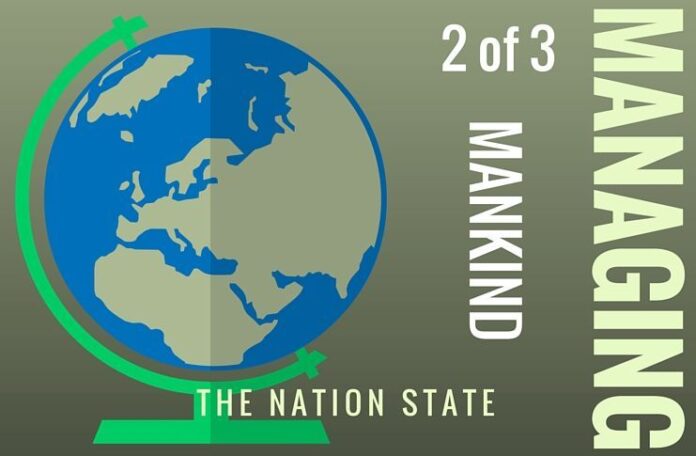
Part 1 of this series can be accessed here.
[dropcap color=”#008040″ boxed=”yes” boxed_radius=”8px” class=”” id=””]N[/dropcap]ormally, most people are sceptical when attempts are made to control the independence of a nation-state. No attempt is made to do so. The operating principle of the independence of a nation-state should be, and is inviolate. The principle has stood the test of time.
But there have been several breaches of this principle, some of which need attention. Some governments have failed to govern equitably so that voluntary organisations have had to assist in providing basic services like water, health services, food and protection from invaders. When aid came, the intervention was not timely to prevent a raid from progressing to a series of raids and eventually a civil war. A few states have been illegally formed and the “natives” have been treated as foreigners. Some states have been so weak that they had to rely on aid and thus become “client states.” Some states are landlocked so that their more powerful neighbours can make life unbearable and expensive by shutting the borders. In such cases, hard-pressed people need an unbiased adjudicator to remove the obstacles to progress; such a one is the UN and its agencies that are selected on a fair basis.
To solve problems independently or with UN aid, the degree, location and size of the problems matter. Consequently, nations are best served with powerful computers that can cope with mega-data. Richer countries that can afford these computers can serve poorer nations for a small fee that would also defray the costs of the machines. Top high-speed computers include Tianhe-2, which can process data at 33 to 86 petaflops per second; Titan – 17.6 petaflops; Sequoia – 17.17; K-computer – 10.5; Mira Blue Gene – 8.6; CSCS Piz Daint – 6.3.
[dropcap color=”#008040″ boxed=”yes” boxed_radius=”8px” class=”” id=””]W[/dropcap]hile still retaining the principle of independence, the UN should use the Quaker method of “gentle persuasion” to make necessary changes for good government. UN interference would only be “by exception.” The UN should be an arbiter of good government; it should set secular rules for the protection of relative primitive tribes that are being deprived of their livelihood; it should demand a 200-year growth plan that would see the employment of the unemployed, at least at a living wage; it should endorse other rules so that minority groups, based on money, religion or power, should not be able to grab the major share of the nation’s wealth. Ethnic culture should not be allowed to dominate national culture. Nations should unanimously subscribe to protect international spaces, like space, high seas, and the poles.
A nation should see interference if an individual’s right has been violated and the national justice system fails to offer redemption. This principle would understandably be very controversial. An individual should be able to appeal to an UN agency when his citizenship or the citizenship of his clan has been refused or renounced; when a government breaks its agreement to pay earned pensions and treats it as aid to a third party; in short, when a national judiciary system breaks down for a few individuals.
To stop politicians from amassing huge sums of money for themselves from public funds, financial institutions should be held accountable and supervision should be tightly controlled. It is frequently argued that since politicians have to spend a lot of money for elections they should be allowed to replace that loss. Tax havens should be banned.
[dropcap color=”#008040″ boxed=”yes” boxed_radius=”8px” class=”” id=””]D[/dropcap]emocracy is the best form of government but, besides having various types of democracy, all forms of government have shown weaknesses, some drastic. However, what form of government a country adopts is less relevant than meeting the basic secular goals which can, and should, be achieved under any caring government. That some types of government are best suited to efficiency is debatable and therefore left alone for the time being.
For the next decade, each country should be committed to achieving universally declared goals: a twelve-year basic education; water and basic health provisions, including dental; housing; and, a living wage at a minimum through the implementation of a 200-year infrastructure plan. In some countries, the one-child policy is necessary to achieve these goals. Each nation will have to submit annual progress reports to the UN, if aid is required. These goals will affect mainly poor nations, but as the decade progresses, higher targets can be set. Overall, the objective for the next decade should be human dignity.
The theory is more important than these suggestions. A government must adopt the Right to Work laws so that there is zero unemployment, at a living wage. Normally a nation should not interfere with family planning, but when national goals cannot be met owing to large population increases, then a one-child policy should be adopted, until such time when the economy can withstand a two-child policy. Each of these policies have their own drawbacks. A living wage should include the level when a citizen can afford to pay taxes so that a citizen’s prestige is enhanced by the fact that he is a tax-payer and a vibrant part of the national system. A great deal hinges on an efficient and fair judicial system. Justice delayed is justice denied. So time limits and penalties should be laid for categorised cases.
[dropcap color=”#008040″ boxed=”yes” boxed_radius=”8px” class=”” id=””]U[/dropcap]nder normal circumstances in a democracy, the party that wins takes the cake and the opposition relegates to an obstructionist party. Efficient government is hampered. Ideally therefore, cabinet and lower level positions should be apportioned among the losing parties. The government then becomes more like a national government, more democratic with considerably less friction.
Eventually, peace not war should yield a form of government that is more akin to Liberal Democracy. The world should not be afraid of nations experimenting with different forms of government. It is the secular goals and results that matter initially. Idealism is the Everest and driver of human thought.
- Part2 – China’s Road to Superpower status - July 20, 2017
- Part1 – China’s Road to Superpower status - July 18, 2017
- P2 – Can or should Qatar be ostracised? - June 29, 2017










